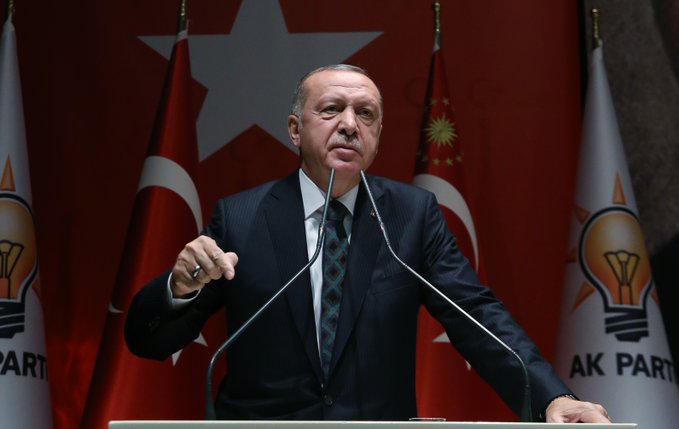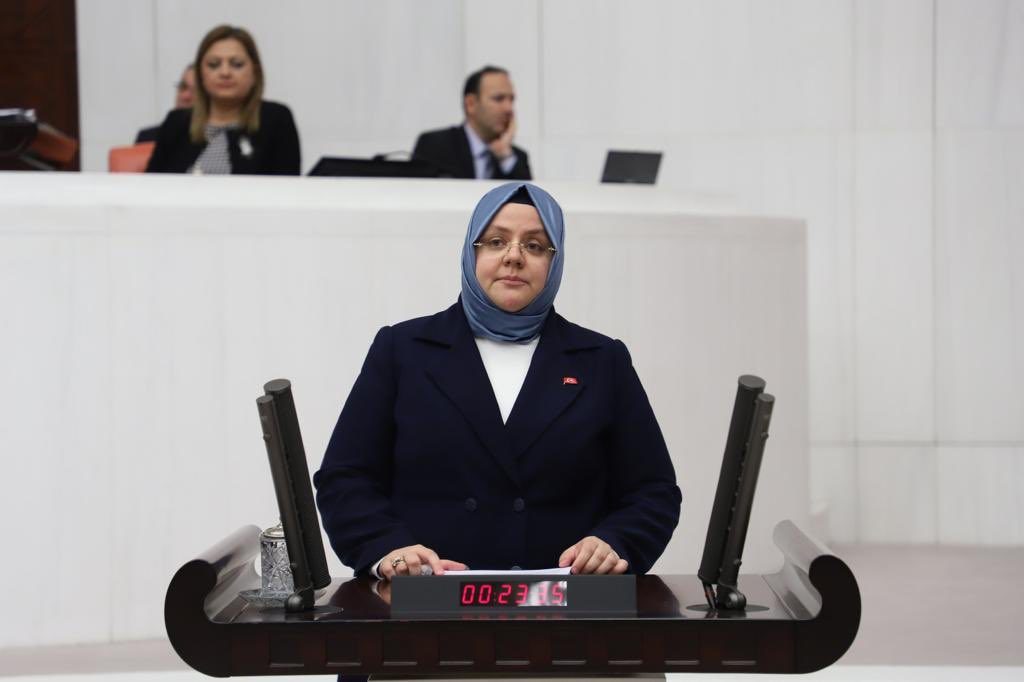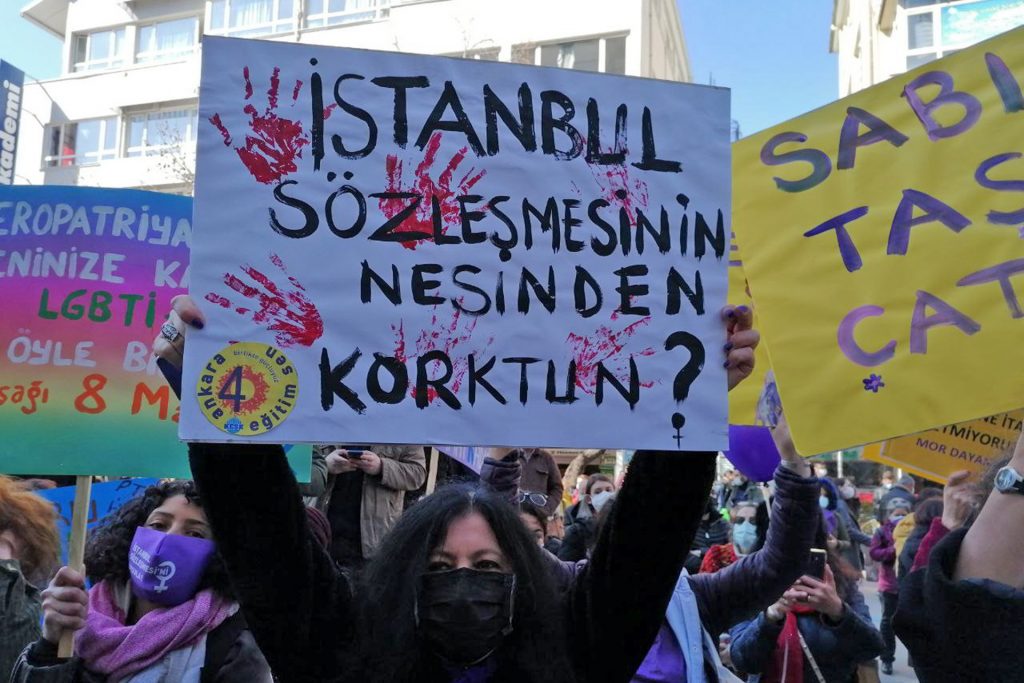Women have taken to the streets to demand President Recep Tayyip Erdoğan reverses his decree for Turkey to withdraw from the Istanbul Convention. The international treaty aims to curb violence against women.
Thousands descended on Rıhtım Meydanı in Kadıköy, Istanbul, to protest the decision. Smaller demonstrations took place elsewhere in the country, including Izmir, Bursa, Manisa, Eskişehir, and Muğla.
Prominent Turkish women’s campaign group Kadın Cinayetlerini Durduracağız Platformu (We Will Stop Femicide Platform) led the charge, emphatically stating online and on the streets, “we do not accept this decision!”
Protestors called for the government to retract its decision, chanting slogans like “Femicide is political” and “You will never walk alone.” Many held aloft pictures of women murdered in Turkey, as others read out their names.
The main opposition Republican People’s Party (CHP) slammed the President’s decision. MP and CHP deputy leader Gökçe Gökçen, who attended and spoke at Saturday’s protest in Kadıköy, said President Erdoğan’s decision would, “Let women continue to be second class and even be killed”.
Yıllardır verdiğimiz mücadeleyi bir gecede silemeyeceksiniz✊🏻
Kararı geri çek, sözleşmeyi uygula!#İstanbulSözleşmesiYaşatır#AklınızdanBileGecirmeyin pic.twitter.com/NpNXuArK4O
— Kadın Cinayetlerini Durduracağız Platformu (@KadinCinayeti) March 20, 2021
Confirmation of the Presidential decree came in the country’s Official Gazette, published early on Saturday, 20 March, creating shock and anger across the country.
Kemal Kılıçdaroğlu vowed to re-adopt the international treaty as soon as CHP was back in power. In a video released on social media, the CHP leader condemned the decision to withdraw from the Istanbul Convention:
“My dear people; a state cannot be governed by midnight decrees. 42 million women’s rights and laws cannot be taken away from them by a midnight decree.”
Gökçen went further, tweeting that President Erdoğan’s decision “was a blow to the will of Parliament.”
Turkey was the first country to ratify the Council of Europe pact, which got its name after being presented and formally adopted in Istanbul in 2011. The Turkish Parliament unanimously ratified the international treaty the following year.
CHP Leader Kemal Kılıçdaroğlu condemns goverment decision to opt out of the Istanbul Convention
İktidardaki zorbaya kadınlar dersini verecek. #İstanbulSözleşmesi geri gelecek! pic.twitter.com/t5yYYWINUh
— Kemal Kılıçdaroğlu (@kilicdarogluk) March 20, 2021
The Istanbul Convention sets out a legal obligation for signatory states to treat men and women equally, and to implement measures to prevent violence against women, including domestic violence. It also brings an end to legal impunity for perpetrators, while expecting states to capture data about the extent of violence against women.
Meral Akşener, leader of the Good Party (İYİ), also condemned the Turkish government for reversing the Istanbul Convention:
“For once in 40 years they got something right; now they give up on it. I would like to ask from here: ‘Why do you step back when the situation of our women is obvious, and there is so much to do?’”
Describing those who support the removal of the Convention and the undermining of women’s rights as a “dirty mentality”, Akşener said, “We will not allow the violation of women’s rights and laws! This freak system will change, the Istanbul Convention will live again!
President Erdoğan’s decree “unlawful”
Lawyers have joined politicians in contending that the decree is not sufficient to repeal the legislation passed in the Turkish Parliament, which embedded the terms of the Convention within Turkey’s domestic law.
Constitutional law specialist and CHP Istanbul MP, Prof. İbrahim Kaboğlu said the President’s decree to end the Istanbul Convention “had no basis under Constitutional law”.
His point was echoed by 78 of Turkey’s 81 provincial bar associations, which issued a joint statement with Turkey Bar Association’s Women Law Commission asserting that the President’s decree was “unlawful” under the Turkish Constitution.
“It is a clear provision of Article 104 of the Constitution that the fundamental rights, personal rights and duties included in the first and second parts of the second part of the Constitution cannot be abolished or regulated by the decision of the President,” said the statement.
“Therefore, in accordance with Article 104 of the Constitution, it is unlawful to issue a Presidential decree regarding the fundamental rights and freedoms included in the Constitution.”
“The President’s decision to terminate the Istanbul Convention has no basis in the Constitution. The contract is in force, it will continue to be implemented,” the joint statement concluded.
Turkey’s national legal body Union of Lawyers (Barolar Birliği) also said in its statement that withdrawing as a signatory from the Istanbul Convention was “against the law”.
President Erdoğan appeases Turkey’s religious right
Speculation had been growing since last summer that President Erdoğan would pull Turkey out of the Istanbul Convention to appease conservative hardliners.

Many on Turkey’s religious and political right view the Convention as “immoral” as it explicitly recognises homosexuality by including categories such as gender identity and sexual orientation. The conservatives claim these run counter to traditional ‘family values’. They also believe the Convention was driving up divorce rates by making it easier for women to leave abusive partners.
Members of the Turkish government took a different line over the weekend as they tried to justify the president’s decision, and bat away the backlash.
Family, Labour and Social Services Minister Zehra Zümrüt Selçuk said on Twitter that women’s rights are guaranteed in Turkey’s Constitution and domestic legislation, and the country could create new laws if required.
Selçuk added that violence against women is a ‘crime against humanity’ and that Turkey will resolutely continue its fight against violence with a “zero tolerance” approach.
Yet the minister’s comments do not tally with the reality in Turkey, which has one of the highest femicide rates across the 37 OECD (Organisation for Economic Co-operation and Development) bloc of member states. Most of the bloc have signed up to the Istanbul Convention.

The government doesn’t release femicide statistics, but data collated by Kadın Cinayetlerini Durduracağız Platformu (KCDP) found 474 women were murdered in 2019 – the highest figures in Turkey in a decade.
Last year, KCDP said 300 women were murdered and another 171 suspicious deaths recorded. At least 78 women have been killed so far in 2021.
These statistics and claims that violence against women in Turkey is growing was emphatically denied by Interior Minister Süleyman Soylu. The controversial minister, who has previously called homosexuals “perverts”, said the claims are “a complete lie” in a statement he tweeted on Saturday.
Other government members also tried to rally around the president. “We continue to protect our people’s honour, the family and our social fabric with determination,” tweeted Justice Minister Abdulhamit Gül.
Turkey is not the first country to seek to ditch the Istanbul Convention. Poland’s nationalist government also wants to quit the treaty, which it considers too liberal. The EU country’s decision to curb abortion and other women’s rights has polarised the country, with hundreds of thousands of Poles protesting the legislative changes.
Main image, top, of women protesting in Istanbul over Turkey’s withdrawal form the Istanbul Convention. Photo © Burcu Yıldırım/Evrensel via Twitter





